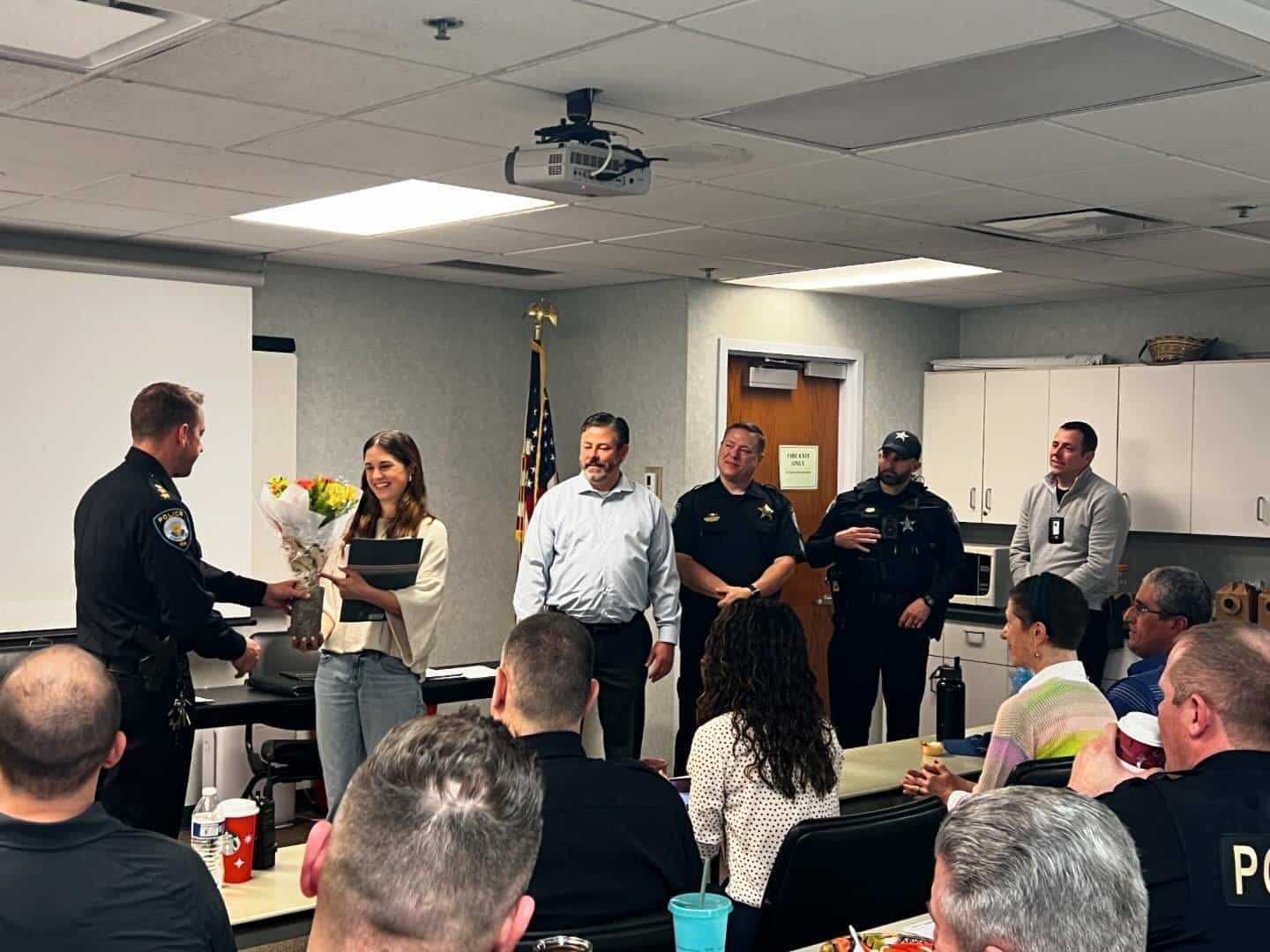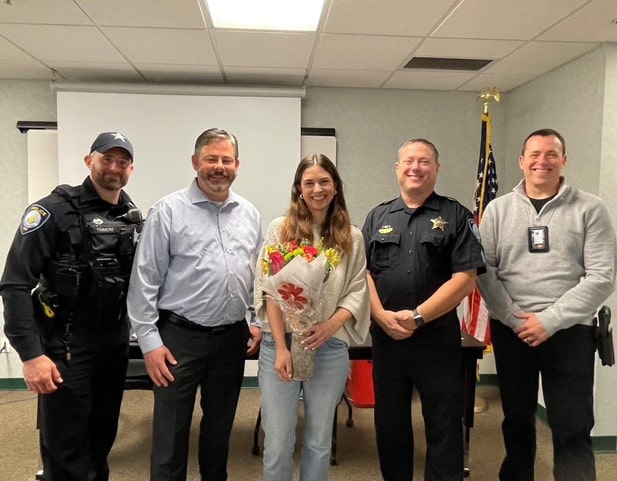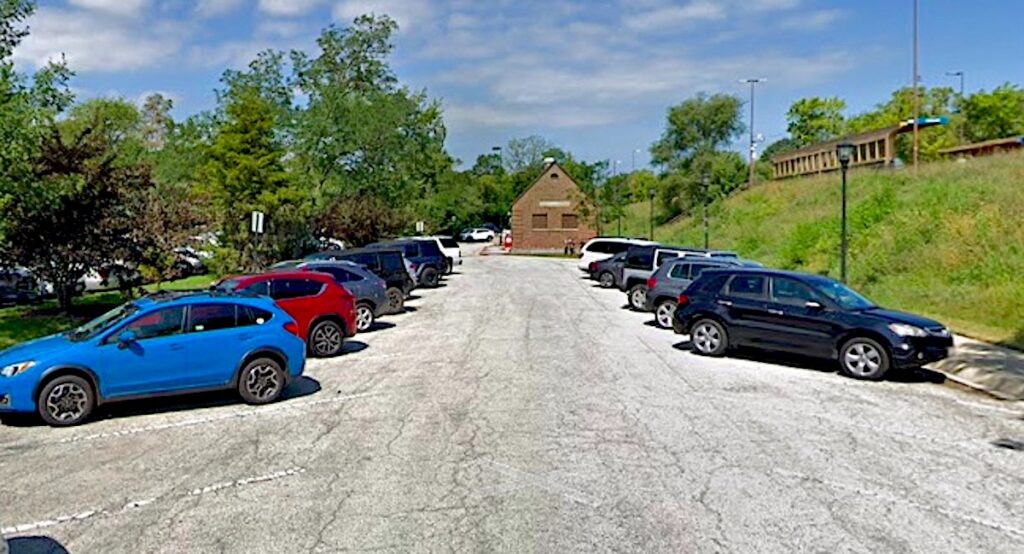
‘Privileged to be here’: Car accident survivor reunited with Winnetka officers who helped save her life
Almost two and a half years after the near-fatal car accident that would change her life forever, Dana Cagen walked into the Winnetka Police Department on her own two feet, defying the odds.
There, on April 8, she told her story to a room full of officers — some of whom had been at the scene of the accident on Dec. 13, 2021, and worked to save her life.
“Even though I do not have a memory of the crash or the time immediately following, I have thought about these officers a lot during my recovery,” read Cagen, a Northbrook native, from her speech as she addressed the officers in their training room. “During these past two years, I’ve wanted to reach out to them just to share how thankful I am for them being there for me that night, and I feel so privileged to be here today to express my gratitude.”
Officers were just finishing up their roll call at 7:20 p.m. Dec. 13, 2021, when they received a call about a car accident on the 1300 block of Willow Road. Cagen, then a college student, was driving a car that was hit head-on by a vehicle traveling at 70 mph — at least 30 mph over the speed limit. The other driver unexpectedly switched lanes into oncoming traffic to cause the crash.
Both drivers were trapped in their cars. The 61-year-old driver of the other vehicle was pronounced dead at 8:01 p.m. at Evanston Hospital.
One of the officers on the scene was Sgt. Karl Larson, who was excited to hear from Cagen and see her doing well when she spoke to the department. He called Cagen a “fighter.”
He described the extraordinary scene to The Record via email: The front end of the vehicle that had been driving at 70 mph was on fire. Cars had stopped to try and assist the driver, with Larson recalling that one man may have had a golf club that he was wielding in an effort to break the windows. Larson and his fellow officers used fire extinguishers in an attempt to stop the fire from spreading to the passenger’s seat as they simultaneously attempted to remove the unresponsive driver.
In the chaos and confusion of the moment, at first, Larson hadn’t realized Cagen was trapped in her vehicle, too.

“I remember looking at Dana’s car and seeing a person or two standing outside the driver’s door calmly watching us,” Larson told The Record in an email. “I thought those people were the driver [and/or] passenger, and [I was] thankful they were okay.
“As the fire department arrived a minute later and took over putting out the fire and removing the other driver, I went over to Dana’s car,” Larson continued. “I realized someone was behind the steering wheel and rushed over. Dana was sitting in the driver’s seat with the dashboard pushed into her legs. I vividly remember Dana asking me several times to get her out of the car. When I looked at her legs, I realized I was not going to be able to remove her and told her she needed to stay there until the fire department came over. I kept reassuring her that she would be okay and held her hand.”
The fire department used extraction tools to open the driver’s door, which had been crushed. When firefighters took over, Larson said he stepped away to take command of the scene and call in additional resources.
In the parking lot on April 8, as Cagen left the event at the Winnetka Police Department, where she was given a bouquet of flowers after her speech and took photos with some of the officers who had saved her life, Larson shared this memory of being at her side when she was trapped in her vehicle with her, hoping, he said, to give her some piece of the lost time.
Though Cagen can’t remember the night of the accident or the days that followed, she said there was something about Larson and their reencounter years later that felt familiar. She found it comforting, too, to be the subject of the officers’ kindness in the training room; it reassured her that she received this same kindness and care when she was trapped in her car.
The after
At the hospital the night of the accident, Cagen was placed in a medically induced coma. When she woke, she said she thought she was in a dream, and she was convinced nurses had confused her with another patient — if she had been in an accident, surely, she thought, she would remember it.
Cagen spent approximately one week in the ICU and had three emergency surgeries. She suffered from a broken left femur, broken left clavicle, a shattered right patella (after she had slammed on the brake during the accident — a reaction that likely saved her life), and perforated small intestine.
The surgeon who’d operated on Cagen’s leg was surprised when he saw her using a walker as he was unsure she would walk again.
The body does keep the score. Even if you don’t have the memories, sometimes your body can still feel anxious.
Dana Cagen on trying to drive again following a horrific 2021 crash
In subsequent surgeries, doctors found shards of glass and pieces of Cagen’s leggings in her right knee. Her right knee is now missing cartilage, and she knows she will have to deal with discomfort and continue strengthening it forever, which she said is a “very small price to pay.”
Through physical therapy and the power of will, Cagen eventually was able to walk without a brace. By April 2022, Cagen, an avid traveler and once avid runner, could hike at Joshua Tree with her mom.
“At first, there was so much anger because my life had really been flipped upside-down,” Cagen said of her emotional state after the accident. “You can really take yourself down this rabbit hole and [into a] really dark place. … It took me time to allow myself to feel [my] emotions and focus more on the gratitude side.”
By “gratitude,” Cagen means a shift in her mindset to see her recovery as a “blessing” and the “best case scenario.” A Facebook group for car accident survivors helped give her hope that her life could return to a sense of normalcy, with one person who’d found himself in a wheelchair now able to ski again.
Because she cannot remember the accident, it was easier for Cagen to get back behind the wheel beginning in the summer of 2022. She now drives to the city and wherever she needs to go, but she avoids driving at night in the winter.
“The body does keep the score,” Cagen said. “Even if you don’t have the memories, sometimes your body can still feel anxious. In that case, I’ve kind of made my car a happy place — put some snacks in there and a stuffed animal and stuff like that.”
According to Cagen, speaking to the officers at the Winnetka Police Department felt like her “final piece of closure” — a way to say “thank you” and have that powerful exchange with the officers.
“Life can still be very beautiful,” she said.
The Record is a nonprofit, nonpartisan community newsroom that relies on reader support to fuel its independent local journalism.
Become a member of The Record to fund responsible news coverage for your community.
Already a member? You can make a tax-deductible donation at any time.

Zoe Engels
Zoe Engels (she/her) is a writer and translator, currently working on a book project, from Chicagoland and now based in New York City. She holds a master's degree in creative nonfiction writing and translation (Spanish, Russian) from Columbia University and a bachelor's in English and international affairs from Washington University in St. Louis.


